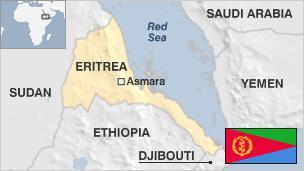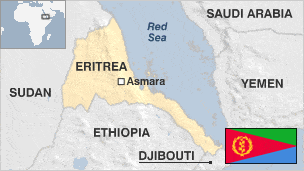-
4 May 2015
- From the section Africa

Eritrea emerged from its long war of independence in 1993 only to plunge once again into military conflict, first with Yemen and then, more devastatingly, with its old adversary, Ethiopia.
Today, a fragile peace prevails and Eritrea faces the gigantic tasks of rebuilding its infrastructure and of developing its economy after more than 30 years of fighting.
A former Italian colony, Eritrea was occupied by the British in 1941. In 1952 the United Nations resolved to establish it as an autonomous entity federated with Ethiopia as a compromise between Ethiopian claims for sovereignty and Eritrean aspirations for independence. However, 10 years later the Ethiopian emperor, Haile Selassie, decided to annex it, triggering a 32-year armed struggle.
This culminated in independence after an alliance of the Eritrean People’s Liberation Front (EPLF) and a coalition of Ethiopian resistance movements defeated Haile Selassie’s communist successor, Mengistu Haile Mariam.
In 1993, in a referendum supported by Ethiopia, Eritreans voted almost unanimously for independence, leaving Ethiopia landlocked.
The two countries hardly became good neighbours, with the issues of Ethiopian access to the Eritrean ports of Massawa and Assab and unequal trade terms souring relations.
In 1998 border disputes around the town of Badme erupted into open hostilities. This conflict ended with a peace deal in June 2000, but not before leaving both sides with tens of thousands of soldiers dead. A security zone separates the two countries. The UN patrolled the zone at one time but pulled out, unable to fulfil its mandate.
In recent years Eritrea has become one of the world’s most secretive countries.
It doesn’t have any privately-owned indigenous media, and sits alongside North Korea in global media freedom rankings.
It also reportedly doesn’t welcome foreign journalists unless they agree to report favourably about the government.
Information ‘black hole’
United Nations officials have complained that the country hasn’t shared information about food supplies in times of drought.
While agencies warned that millions in the Horn of Africa were being affected by famine in 2011, Eritrea was denying a crisis.
“It’s been a black hole for us, we don’t know what’s going on there,” said Matthew Conway, spokesman for the UN humanitarian coordination office in Nairobi at the time. “But that’s not to say it’s not happening.”
The World Bank says that by virtue of its location in the Sahel, Eritrea suffers periodic droughts and chronic food shortages hampering development efforts. It says however that the government indicated that it was managing food stocks carefully.
The UN has been investigating human rights in Eritrea, but its special rapporteur has been denied entry. She said in 2014 that a refugee exodus was being fuelled by alleged abuses including extrajudicial executions, torture and forced military conscription that can last decades.
In 2014 Eritreans were reportedly among the most numerous of those attempting the risky crossing from North Africa to Europe by boat.
Eritrea has become a gold producer, with mining expected to become an important source of revenue and growth.



